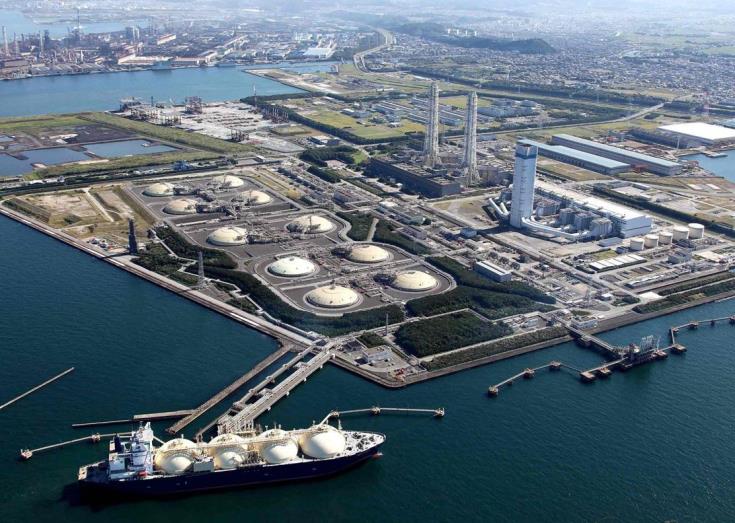The European Investment Bank (EIB) has approved €150 mln to fund the landmark construction of a terminal to enable the import of liquefied natural gas (LNG) in Cyprus.
Cyprus’ natural gas company (DEFA) announced that the project will be implemented by Natural Gas Infrastructure Company (ETYFA).
The EIB loan has a duration of 20 years with a favourably low-interest rate and will cover capital construction expenditure, a DEFA statement said.
This loan covers nearly half the project’s cost which is budgeted at €289 mln.
“The EIB decision was taken following an evaluation of the project’s sustainability and the growth prospects its successful implementation creates for the Republic of Cyprus.”
ETYFA has secured €101 mln from the European Commission through the Connecting Europe Facility (CEF) and €43 mln from the Cyprus Electricity Authority through share capital participation.
With EIB funding in place, infrastructure work can now commence at Vasiliko in Limassol as the amount approved covers a large chunk of the expenditure needed to complete the LNG construction.
“This decision emphatically reflects the trust of EU institutions both towards DEFA and Cyprus’ energy authorities.”
In December, Cyprus signed a landmark deal with a Chinese-led consortium to build its first terminal for the import of LNG for electricity generation.
ETYFA signed a contract to build its first LNG terminal with the multinational consortium headed by China Petroleum Pipeline Engineering.
The consortium also includes METRON (Greece), Hudong-Zhonghua Shipbuilding (China) and Wilhelmsen Ship Management (Norway).
DEFA has launched an additional tender for the LNG supply, attracting expression of interest from 25 suppliers.
Cyprus intends to import approximately 0.5 bcm of LNG through Gas Sale Purchase Agreements (GSPAs) with a duration of three to four years, maintaining the option to purchase LNG also from SPOT markets.
Energy diversification
Turning to natural gas will help Cyprus safeguard energy supply, diversify the energy mix, and promote competition in the electricity market through the involvement of independent producers.
Cyprus had three unsuccessful attempts to import natural gas in the past due to its small size and energy needs.
The use of natural gas will reduce Cyprus’ carbon footprint by 25% to 30% in replacing oil-burning for electricity generation.
Based on conservative estimates, electricity generation cost savings will range between 15% to 25% from 2022-2025.
Greek oil and gas producer Energean has made a pitch to sell its Israeli natural gas to Cyprus via pipeline at a “competitive price” while Nicosia is opting for LNG.
It has offered to build a $350 mln pipeline to Cyprus — using its own money — to supply gas from its Karish North field to the island.
So far, Cyprus has said it does not need the pipeline as it plans to install a floating LNG import terminal.
It is also set to award a long-term supply contract for LNG — in effect creating a single-supply market.
Norway’s Hoegh LNG has officially applied to Nicosia for a liquefied natural gas infrastructure ownership, operations, and development license in Cyprus.
Hoegh LNG said it was offering Cyprus the stop-gap installation, within the first quarter of 2021, of an FSRU at Vasiliko and a pipeline to transport the gas to the EAC’s power plant and potentially other users.
“This solution can serve as interim until the state-owned LNG infrastructure is in place at Vasiliko.”
The company said its proposal “does not in any way interfere with the government’s plans”.
It said Cyprus, “will be able to save in excess of €100 mln per year from 2021 onwards, by switching power generation to burning natural gas from heavy fuel oil”.
It clarified that the proposal “requires no state aid or investment” and Hoegh LNG is “open to working closely with DEFA, for delivering this important infrastructure project for Cyprus”.
Cyprus is pushing forward to diversify its energy mix to reach lower emission targets for the country’s power production.











[…] EIB approves €150 mln for Cyprus LNG terminal Financial Mirror […]
[…] EIB approves €150 mln for Cyprus LNG terminal Financial Mirror […]
[…] EIB approves €150 mln for Cyprus LNG terminal Financial Mirror […]
[…] EIB approves €150 mln for Cyprus LNG terminal Financial Mirror […]
[…] EIB approves €150 mln for Cyprus LNG terminal Financial Mirror […]
[…] EIB approves €150 mln for Cyprus LNG terminal Financial Mirror […]
[…] EIB approves €150 mln for Cyprus LNG terminal Financial Mirror […]